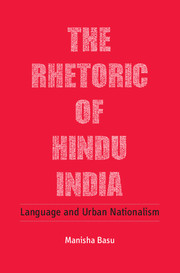Book contents
- Frontmatter
- Dedication
- Contents
- Preface
- 1 Introductory Matters: The Strange Case of Secular India
- 2 Time's Victims in a Second Republic: New Histories, New Temporalities
- 3 To Make Free and Let Die: The Economics of Metropolitan Hindutva
- 4 A Power over Life and Rebirth: V. D. Savarkar and the Essentials of Hindutva
- 5 Between Death and Redemption: Hindu India and its Antique Others
- 6 The After-Life of Indian Writing in English: Telematic Managers, Journalistic Mantras
- Bibliography
- Index
Preface
Published online by Cambridge University Press: 23 July 2017
- Frontmatter
- Dedication
- Contents
- Preface
- 1 Introductory Matters: The Strange Case of Secular India
- 2 Time's Victims in a Second Republic: New Histories, New Temporalities
- 3 To Make Free and Let Die: The Economics of Metropolitan Hindutva
- 4 A Power over Life and Rebirth: V. D. Savarkar and the Essentials of Hindutva
- 5 Between Death and Redemption: Hindu India and its Antique Others
- 6 The After-Life of Indian Writing in English: Telematic Managers, Journalistic Mantras
- Bibliography
- Index
Summary
The Rhetoric of Hindu India narrativizes the late twentieth century rise in India of an urban right-wing Hindu nationalist ideology called Hindutva. It does so in the light of three interrelated changes in the Indian political and cultural situation of this time: first, the opening up of the economy to global finance capital and consumer goods; second, the successful spread in urban and small-town Indian centers of networks of information processing, telecommunications and transnational managerial forms; and third, the rise of India as one of the most important business process outsourcing capitals in the erstwhile third world. In this transformed environment, I argue that Hindutva distinguished itself from an older variant of Hindu nationalism. The old Hindu nationalism was largely articulated in vernacular idioms, had strongly regionalist affiliations and was primarily associated with upper-caste agrarian aristocracies and mid-caste merchant capitalists. In contrast, late-twentieth century Hindutva aspires to be a pan-Indian, urban project and home to the emerging, digitally-enabled, technocratic middle-classes of the nation. The success of this new-age Hindu nationalism, which I call ‘metropolitan Hindutva’, has been greatly enhanced by its adoption of English in a type of globally cybernetic form to an increasingly Sanskritized national culture. This politics of language is the promised tool for overcoming the nation's many heterogeneities based in class, caste, language and region and for shaping a homogenously Sanskritic-Hindu population that is to be representative of the new India. The citizenry thus formed is however legitimately national only because it is, first and foremost, globally viable as a digitally savvy, upwardly mobile and urban-metropolitan technocracy.
My contention in this book is that it is through its politics of language that Hindutva launched its attack on a history of postcolonial secularism which had been at the foundation of conceptualizations of an independent Indian nation-state. Arguing that secularism in the Indian Republic was a pseudo form geared toward appeasing minorities and thereby manipulating electoral balances, the ideologues of metropolitan Hindutva proposed to usher in what they claimed to be ‘a better secularism’ that would be the harbinger of a second Indian Republic. In the new India, there would be no place for an older national population that had always formed itself in relation to a political commitment to protect and tolerate difference in all its forms.
- Type
- Chapter
- Information
- The Rhetoric of Hindu IndiaLanguage and Urban Nationalism, pp. ix - xivPublisher: Cambridge University PressPrint publication year: 2016



